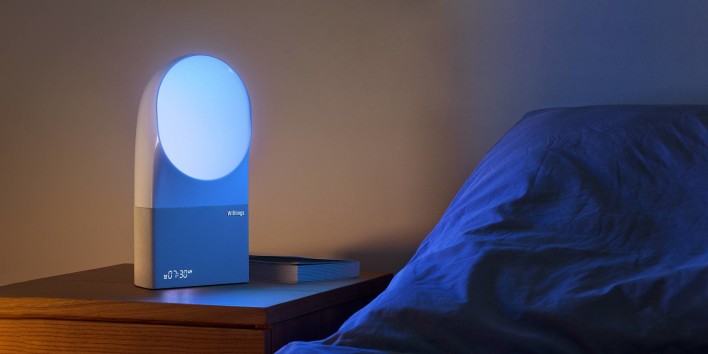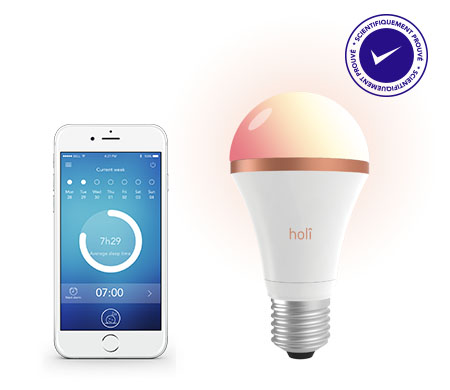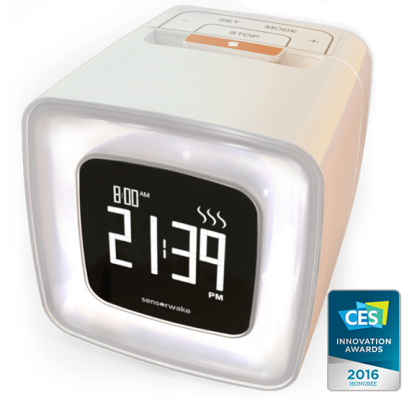This article is part 2 of my sleep tech round up for 2016.
This new burst of alarm clocks on the scene is important– because let’s be honest, our use of electronics (tablets, smartphones, TVs etc) dominates our bedrooms and pollutes our sleep.
I struggle with this too. Sometimes I win, and admittedly, sometimes Netflix wins.
But, hey, if we can’t get the electronics out of the bedroom, maybe one more device will save us! The alarm clock is a natural winner in this vein, as it is the guardian of our rest that has been ignored for so, so long.
Note: I haven’t personally tested these devices, so these are not reviews so much as curated research and my thoughts on what makes them worth our while. OK, it’s actually a wish list.
Hello.is: Bedside Sleep Tracker
![]()
Hello.is calls itself a bedside sleep tracker. It’s composed of two devices: a sleek modern alarm clock, and a small coin you clip it to your pillow once and forget about it, so it measures your sleep activity over time and collects the data.
The sleep measure (actigraphy) is not exactly the most sophisticated sleep measure on the market (your iPhone can do it with a $10 app purchase), but I think the real value this device is that it also measures air temperature, humidity, and sound disturbances, so it can give you personalized advice over time about how to improve your sleep sanctuary for optimal rest.
The alarm also sounds nice: 15 programmable tones that gently awaken you near your targeted time when you are in a light stage of sleep.
Of course, my iPhone has some pretty nice wake up tones, too. The price is right tho — Hello.is costs $129. That’s probably worth it, especially if you want evidence-based advice for improving your sleeping environment and also have a penchant for waking up to a glowing Death Star. Admittedly, I totally want one.
Wethings Aura: The Connected Alarm Clock

The byline of the Aura is “high tech alarm hidden inside a stylish lamp.” That’s putting it a little optimistically, as to me the Aura looks like a periscope that swallowed a flashlight. Still, I like the premise of this alarm clock a lot.
The Aura measures temperature, light levels and background noise to help you find what’s stealing your sleep. This smart alarm is also partnered with Spotify, and if you have a premium account with Spotify, this alarm clock really makes sense as you can stream directly from the embedded speakers and wake up to whatever awesome music you want.
Aura’s truly unique feature is the light-based alarm clock: the clock will begin to brighten the room slowly, simulating dawn. It’s a nice way to wake up, and one that our sleep hormones reliably pay attention to.
Add an optional sleep measure under your mattress, and the Aura really starts to shine. This hands-off sensor measures sleep movements, breathing cycles and heart rate, providing a pretty accurate view of your sleep staging (as accurate as any home EEG measures), so you’ll know how much deep sleep, REM, and light sleep you really get. This data is then integrated with the other environmental measures, making the Aura a true smart alarm.
Oh, Aura also work with Nest, the smart thermostat, so that once you’re asleep, your house begins to cool down to the best temperature zone for restful sleep. Pretty rad, if you have a Nest.
The Aura by itself retails for $189, but if you want the optional (essential) sleep sensors, it’s $299. I want this badly, and also a Nest, and a premium Spotify account, and a pony.
Holi: The Smart Light Bulb
 The Holi is a clock but not in the usual sense of the word: it’s a smart light bulb that uses graduated light therapy to help you go to sleep, and to wake you up. The central concept is key, as we are really wrecking our rest (and our kids’ rest) with the blue light that emanates from tablets and mobile devices at night.
The Holi is a clock but not in the usual sense of the word: it’s a smart light bulb that uses graduated light therapy to help you go to sleep, and to wake you up. The central concept is key, as we are really wrecking our rest (and our kids’ rest) with the blue light that emanates from tablets and mobile devices at night.
Light therapy works by eliminating blue light in the evenings, encouraging the production of melatonin. In the morning, the same bulb wakes up the sleeper with a light profile like the sun that includes blue light, so we wake up gradually through an unconscious hormonal reaction to daylight, not from a sudden disturbance.
Yes, this is big, as it’s suspected that routine, natural awakenings with the sun are a powerful key to feeling rested and ready for the day. Our ancestors benefited from this, and research is supports that graduated awakening from light therapy (called “dawn simulation) is known to affect arousal levels and mood after awakening.
But what makes this even better is how Holi is compatible with a number of other smart devices in its “Sleep Companion” upsell– including the Wethings Aura sleep monitor described above — as well as Nest’s smart thermostat, and a number of sleep-tracking devices including Jawbone, iHealth and Google Fit.
If you are already connected to these services, you end up with a fully functional analysis of your sleep, your room’s temperature and humidity, and a gentle natural way of waking up that reinforces your own body clock.
Plus, you get a state-of-the-art 50 watt light bulb. So cool! I want one.
SensorAwake: An Alarm Clock That Smells
 Out of left field, may I introduce SensorAwake, “the world’s first olfactory alarm clock.” This device debuted at CES last fall and was praised mightily by tech bloggers.
Out of left field, may I introduce SensorAwake, “the world’s first olfactory alarm clock.” This device debuted at CES last fall and was praised mightily by tech bloggers.
Rather than wake you up with sound, SensorAwake releases a delicious odor of your choice to rouse you to the world. So far, those choices are peppermint, fresh-baked croissants, the seaside, lush jungle (??), chocolate, and espresso.
I’m not saying this will work, but this might actually work. We know that smells can be detected during sleep, as they actually can influence your dreams. But will the smell of the jungle (again, I have no idea what this means, but keep imagining a stinky wet dog) do the trick? According to some independent tests, and a couple media outlets, it works.
But according to some sleep science, maybe not. This 2004 study suggests that scent-alarms work reliably only for the lightest of sleep, Stage 1, but not for Stage 2 or deeper sleep. Still, this is just one study, and what we don’t know is if you can prime yourself to wake up to a certain smell with proper expectation and incubation.
The smells, by the way, are delivered by cartridge; and each cartridge lasts for about 30 awakenings. The scents may be fake, but they are certified safe by a number of air quality organizations.
I think this could find a nice market with dreamers, given what we know about how scents can influence dream content, including the potential of inducing lucid dreams.
The only question that remains for me is why would you want to wake up to the smell of fresh based croissants when there aren’t any actual croissants to be had? That would just make me grumpy and want to roll back over.
It costs $89 in pre-order. Despite my confusion over the jungle scent and weirdness over the false croissant promises, I still want this.